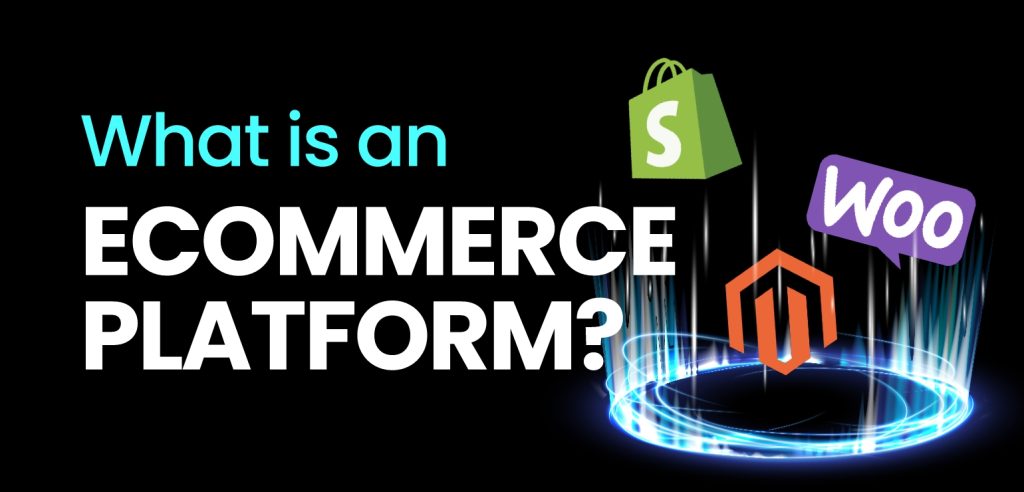What is an eCommerce Platform?

What is an eCommerce Platform?
An eCommerce platform is a software solution that enables businesses to create and manage an online store. In other words, it’s a website builder for businesses that want to sell products and services online.
The word “platform” can be a bit misleading because it suggests that there is only one type of eCommerce platform. In reality, there are four main types of eCommerce platforms, each with its own set of features and benefits:
- Self-hosted eCommerce platforms
- SaaS (Software as a Service) eCommerce platforms
- Open-source eCommerce platforms
- Enterprise eCommerce platforms
Self-Hosted eCommerce Platforms
A self-hosted eCommerce platform gives you complete control over your website and data. This type of platform is installed on your own web server, which you need to pay for and manage. The two most popular self-hosted eCommerce platforms are WooCommerce and Magento. Other examples include PrestaShop, BigCommerce, and Shopify.
The main advantage of using a self-hosted platform is that you have full control over your website. You can customize the design, add or remove features, and scale your website as you see fit. The downside is that you need to pay for hosting, manage updates and security yourself, and hire developers whenever you want to make changes to your website.
SaaS (Software as a Service) eCommerce Platforms
A SaaS platform is a cloud-based solution that gives you everything you need to build and manage your online store—without having to worry about hosting, managing updates, or security. The trade-off is that you don’t have full control over your website; the provider manages all aspects of the platform for you. Shopify is the best-known example of a SaaS platform but there are others such as Bigcommerce, Volusion, and Squarespace Commerce.
The main advantage of using a SaaS platform is that it’s quick and easy to set up an online store without any technical knowledge or expertise. Plus, you don’t have to worry about hosting or managing updates—the provider takes care of all of that for you. The downside is that you don’t have full control over your website; if you want to make changes, you need to work with the provider or hire a developer who knows how the platform works.

Open-Source eCommerce Platforms
Open-source platforms are similar to self-hosted platforms in that they give you complete control over your website, but they differ in one key way: the code is open source, which means anyone can contribute to its development or create their own fork (version) of the software. WooCommerce and Magento Community Edition are two of the most popular open-source platforms but there are others such as PrestaShop, os Commerce, Zen Cart, and Drupal Commerce.
Being open source has several advantages: firstly, because anyone can contribute to its development, open source software is often more reliable and better supported than proprietary software; secondly, because anyone can create their own version of the software (known as a fork), there’s more flexibility in terms of design and functionality; thirdly, because the code is open source, it’s usually cheaper to develop on open source platforms than on proprietary ones—although this depends on the specific platform being used. The downside to using an open-source platform is that it requires more technical knowledge than other types of platforms; if you want to make changes or additions to your website, you either need to be able to code yourself or hire someone who can do it for you.
Enterprise Ecommerce Platforms
Enterprise Ecommerce platforms are designed for businesses with large budgets and complex requirements—typically businesses that do millions of pounds in sales per year. These solutions are usually custom built by vendors such as Oracle, Adobe, SAP Hybris, commercetools, Insite Software, OroCRM, commercenet. Because these solutions are custom built, they come with all the features and functionality that businesses need—and nothing they don’t. The trade-off is that enterprise Ecommerce solutions are very expensive —often hundreds of thousands or even millions of pounds and require lengthy implementations which can take months or even years. If money isn’t an issue and you need a solution that’s tailor-made for your business, then an enterprise Ecommerce platform might be right for you. Otherwise, we recommend using one of the other types of platforms on this list.

In conclusion, there are four main types of ecommerce platforms – self-hosted, SaaS, open-source, enterprise – each with its own set of features and benefits. Do some research and decide which option makes the most sense for your business needs and budget.
If you want to find out more, why not take a look at our FAQs? Or even get in touch and we’ll be happy to help!


 Back
Back
